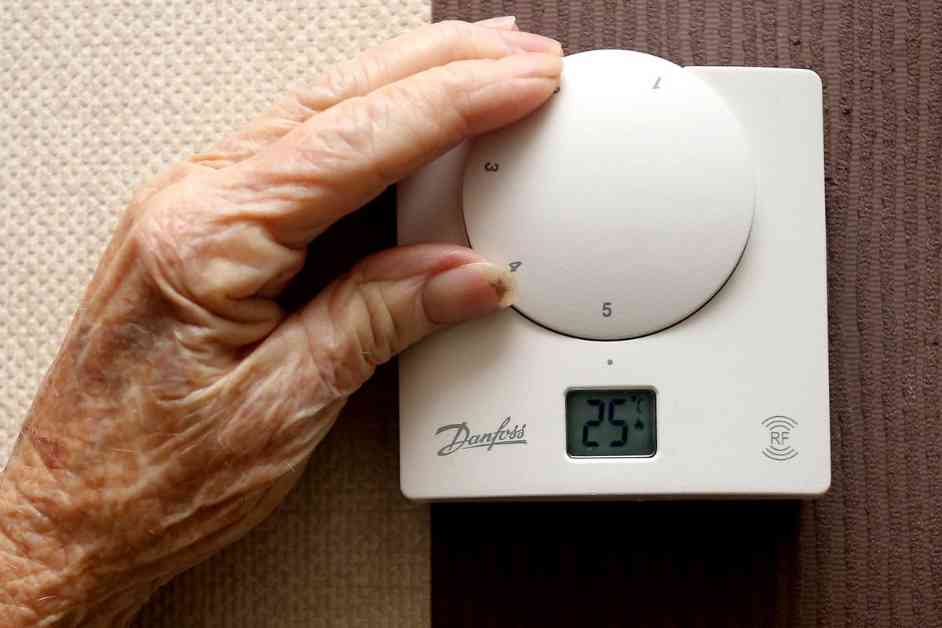Charities and pensioner advocacy groups are expressing growing concerns over the decision by the Government to cut winter fuel payments for approximately 10 million pensioners at a time when energy costs are on the rise. This move comes as the energy price cap increases, putting additional financial strain on older individuals who are already struggling to make ends meet.
The Government announced in July that winter fuel payments would only be issued to pension credit recipients or claimants of certain means-tested benefits, such as universal credit. This decision means that around 10 million people will lose this vital allowance, which was introduced in 1997 to assist eligible pensioners with the costs of heating their homes during the winter months.
Statistics released by the Department for Work and Pensions (DWP) indicate that the number of individuals who received the payment last winter was 214,000 more than the previous year, highlighting the growing need for support in light of rising energy costs. The decision to means test the winter fuel payment has sparked widespread criticism from various quarters, with calls for the Government to reconsider its plans given the current economic climate.
Lib Dem Treasury spokeswoman Daisy Cooper has voiced her concerns, stating that the impending price rise will be a significant burden for pensioners who are already struggling to cope with the impact of the winter fuel payment cuts. Cooper emphasized the importance of ensuring that vulnerable pensioners receive the support they need to navigate the challenging winter months ahead.
Charities like Age UK have also condemned the Government’s decision to restrict winter fuel payments to those on pension credit, describing it as “reckless and wrong.” Caroline Abrahams, charity director at Age UK, warns that this move spells disaster for pensioners on low and modest incomes, who are likely to face increased financial hardship as a result.
The decision to means test the winter fuel payment is estimated to save the Government £1.4 billion this year, a move that has been defended by Labour as necessary to bridge the gap between spending plans and available funds. However, critics argue that this cost-saving measure will have detrimental effects on vulnerable pensioners who rely on the payment to cover essential heating costs during the winter months.
Amidst growing calls for the Government to reverse its decision, both the Conservatives and the Greens have advocated for making winter fuel payments available to all pensioners this winter. Delegates at Labour’s annual conference have also backed a union motion urging the Government to reconsider the cut, although it remains to be seen whether these appeals will prompt a change in policy.
With energy prices soaring to unprecedented levels, the removal of winter fuel payments for millions of pensioners has raised concerns about the impact on individuals’ ability to heat their homes during the colder months. Charities and campaign groups are urging the Government to introduce targeted bill support and expand existing support funds to help alleviate the financial strain on vulnerable households.
Citizens Advice has called for targeted bill support to reflect the realities of people’s energy needs, while the End Fuel Poverty Coalition has emphasized the need for reductions in standing charges and the introduction of a social tariff to assist those struggling to afford their energy bills. The coalition’s co-ordinator, Simon Francis, warns that older people who previously received the winter fuel payment but are now excluded from eligibility will face even greater financial hardship this winter.
As the energy industry continues to report significant profits, there are growing calls for the Government to take action to ensure that vulnerable households are adequately supported during this challenging period. While long-term plans to improve energy efficiency and stabilize prices are welcomed, immediate measures are needed to address the pressing needs of pensioners and low-income families facing escalating energy costs.
In conclusion, the decision to cut winter fuel payments for millions of pensioners has sparked widespread concern and calls for urgent action to mitigate the impact of rising energy costs. As winter approaches and heating bills soar, it is essential that the Government prioritizes the well-being of vulnerable individuals and implements measures to ensure they can stay warm and comfortable during the colder months ahead.












